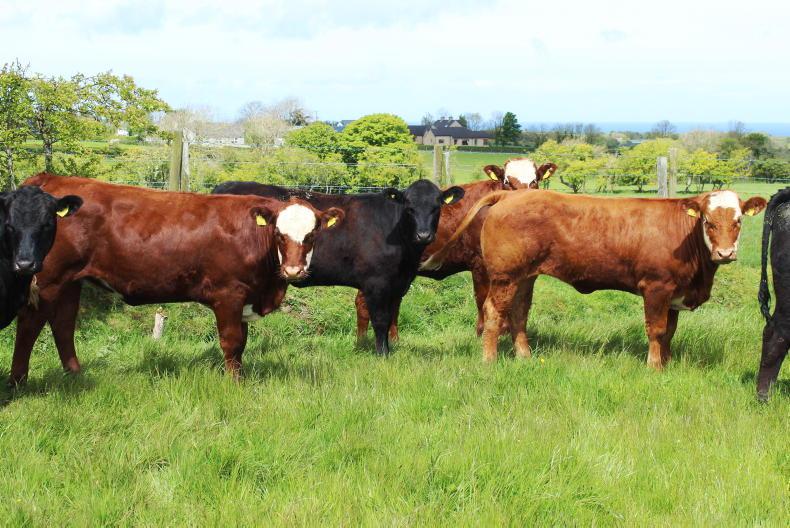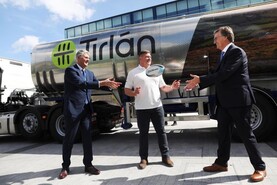The latest price quotes for chemical fertiliser put CAN around £730 to £750/t for purchases made from mid to late May.
While this is £100/t below the cost of straight nitrogen in April and £150 to £170/t below March price lists, CAN is still three times more expensive when compared to last May.
For a suckler farmer with 100ac of land and operating a 60-cow herd, with all calves sold as weanlings, the rise in nitrogen price will have a significant impact on break-even sale price this autumn.
If we assume that the farmer applies four bags/acre of CAN across 70ac over the season, along with three bags of CAN/ac for first cut, and two bags/ac for second cut, than total fertiliser use is 22t per year.
Fertiliser costs
Last year, assuming CAN averaged £250/t, the fertiliser bill came to £5,500. In 2022, if all fertiliser was purchased in March at £600/t, the cost rises to £13,200. Alternatively, if 50% of fertiliser was purchased at £600/t in early March and the remainder at £750/t, nitrogen costs come to £14,850.
Break-even
Assuming all fertiliser was bought at £600/t, it is an increase of £7,700. Where 50 calves are weaned and sold annually, along with 10 cull cows, the increase in fertiliser costs split evenly across these 60 head is £128. To cover this increase, the sale price of a 350kg weanling needs to rise by 37p/kg.
Where half the fertiliser was bought at £600/t and the rest at £750/t, it is a £9,350 increase year-on-year, so the 60 head sold must each realise £156 more than in 2021. On a 350kg weanling, it is an extra 45p/kg compared to 2021.
Dairy farm
For a dairy farmer milking 100 cows, using 45t of fertiliser annually, moving from 100% of CAN purchased at £250 last year to £600/t for 2022, the rise in fertiliser cost comes to £15,750.
Assuming cows yield 7,500l annually, the additional fertiliser costs adds 2p/l to production costs this year.
However, if the same farmer purchased 25t of the annual fertiliser requirement in early March at £600/t and the remaining 20t at current levels of £750/t, total fertiliser purchased rises to £30,000. Across the same average yield, higher fertiliser costs amount to 3p/l.
Read more
Dairy management: Blight warning equals growth warning
New-crop wheat markets continue to surge
The latest price quotes for chemical fertiliser put CAN around £730 to £750/t for purchases made from mid to late May.
While this is £100/t below the cost of straight nitrogen in April and £150 to £170/t below March price lists, CAN is still three times more expensive when compared to last May.
For a suckler farmer with 100ac of land and operating a 60-cow herd, with all calves sold as weanlings, the rise in nitrogen price will have a significant impact on break-even sale price this autumn.
If we assume that the farmer applies four bags/acre of CAN across 70ac over the season, along with three bags of CAN/ac for first cut, and two bags/ac for second cut, than total fertiliser use is 22t per year.
Fertiliser costs
Last year, assuming CAN averaged £250/t, the fertiliser bill came to £5,500. In 2022, if all fertiliser was purchased in March at £600/t, the cost rises to £13,200. Alternatively, if 50% of fertiliser was purchased at £600/t in early March and the remainder at £750/t, nitrogen costs come to £14,850.
Break-even
Assuming all fertiliser was bought at £600/t, it is an increase of £7,700. Where 50 calves are weaned and sold annually, along with 10 cull cows, the increase in fertiliser costs split evenly across these 60 head is £128. To cover this increase, the sale price of a 350kg weanling needs to rise by 37p/kg.
Where half the fertiliser was bought at £600/t and the rest at £750/t, it is a £9,350 increase year-on-year, so the 60 head sold must each realise £156 more than in 2021. On a 350kg weanling, it is an extra 45p/kg compared to 2021.
Dairy farm
For a dairy farmer milking 100 cows, using 45t of fertiliser annually, moving from 100% of CAN purchased at £250 last year to £600/t for 2022, the rise in fertiliser cost comes to £15,750.
Assuming cows yield 7,500l annually, the additional fertiliser costs adds 2p/l to production costs this year.
However, if the same farmer purchased 25t of the annual fertiliser requirement in early March at £600/t and the remaining 20t at current levels of £750/t, total fertiliser purchased rises to £30,000. Across the same average yield, higher fertiliser costs amount to 3p/l.
Read more
Dairy management: Blight warning equals growth warning
New-crop wheat markets continue to surge






 This is a subscriber-only article
This is a subscriber-only article











SHARING OPTIONS: